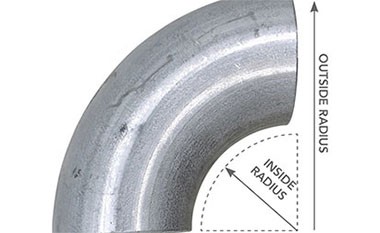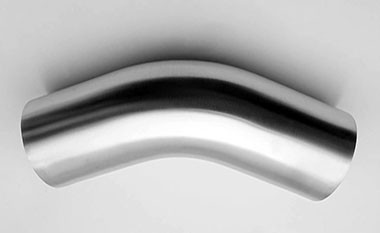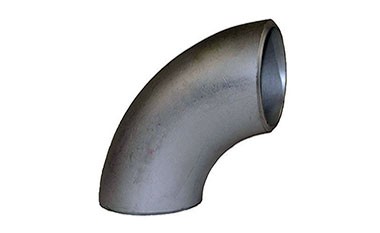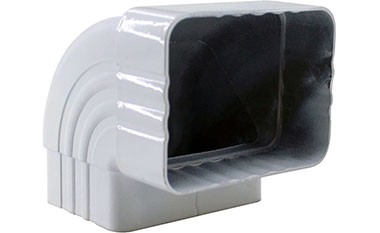Bent aluminum pipes or profiles designed to change the direction of flow in piping systems, widely used in plumbing, HVAC, and industrial applications.
aluminum elbows Supplied Forms
-
Aluminum 90 Degree Elbow
An aluminum 90-degree elbow is a type of pipe fitting used to change the direction of fluid flow in a pipeline by 90 degrees.
-
Aluminum 45 Degree Elbow
An aluminum 45-degree elbow is a pipe fitting designed to redirect fluid or gas flow at a precise 45-degree angle.
-
Aluminum Weld Elbows
Aluminum welded elbows are curved fittings used in piping systems to connect and change the direction of fluid flow, welded to enhance strength and durability.
-
Aluminum Downspout Elbows
Aluminum downspout elbows are specifically designed fittings for drainage systems (such as gutters or outdoor pipes). These elbows make it easier to bend downspouts, allowing water to flow effectively from the roof to the ground or into the drainage system.
An aluminum elbow is a critical component in plumbing and pipework systems, designed to connect pipes at a 90-degree angle. Its primary function is to redirect water or other fluid efficiently while maintaining sturdy connections. Known for its durability and flexibility, the aluminum elbow has become a popular choice in various industrial and commercial applications.
Aluminum alloys, due to their excellent corrosion resistance, light weight, and workability, are widely used in the manufacture of these pipe fittings. Aluminum elbows can be produced at various angles (e.g., 45 degrees, 90 degrees, 180 degrees, etc.) and in various specifications to meet the needs of different piping systems.
Types of Aluminum Elbows
By Angle Classification
| Elbow Type | Description |
| 45-degree Aluminum Elbow | The 45-degree aluminum elbow is a fitting used to change the direction of the pipe by 45 degrees. It is typically applied in environments where compact layouts are required, particularly inside machinery, equipment connections, and spaces with limited room. This elbow allows the piping system to save space and optimize layout, making the arrangement more efficient. Its smaller angle change is suitable for fine adjustments in the pipe direction while ensuring smooth fluid flow with minimal pressure loss, making it widely used in industrial piping systems and custom equipment installations. |
| 90-degree Aluminum Elbow | The 90-degree aluminum elbow is the most common type of pipe fitting, widely used in various piping systems, including buildings, industrial facilities, and household water systems. This elbow features a simple design, enabling vertical or horizontal direction changes in the piping, altering the flow direction of the fluid. The reliability and efficiency of the 90-degree aluminum elbow make it an essential component in most piping systems, especially when significant turns are required. It ensures smooth fluid flow and prevents unnecessary flow loss, making it widely used and easy to maintain. |
| 180-degree Aluminum Elbow | The 180-degree aluminum elbow is commonly used in applications where a long-distance turn or closed loop in the piping system is required. It completely reverses the flow direction of the pipe and is essential in applications that need the fluid to change direction entirely, such as in recirculating water systems and industrial steam pipelines. This elbow allows the piping system to form a perfect closed loop or long-distance turn, ensuring stable fluid flow with no dead spots, suitable for complex piping layouts and offering excellent durability and strength, capable of withstanding high temperatures or pressures. |
By Manufacturing Process Classification
| Elbow Type | Description |
| Extruded Aluminum Elbow | Extruded aluminum elbows are produced using extrusion forming technology, allowing precise shaping of the required external and internal forms. This manufacturing process ensures high accuracy and excellent dimensional consistency, making it ideal for mass production. Extruded aluminum elbows are widely used in standardized pipe connections, providing stable performance and ensuring the efficient operation of the piping system. Their advantages include compact structure, high strength, and the ability to meet high-volume, standardized connection requirements. They are widely used in construction, industrial, and HVAC systems. |
| Cast Aluminum Elbow | Cast aluminum elbows are made using casting techniques, which can produce elbows with complex shapes, suitable for specific engineering needs. The design of these elbows can include asymmetric shapes, special angles, and other complex designs. The flexibility of the casting process allows it to meet non-standard or specialized piping layout requirements. Cast aluminum elbows are typically used in highly customized piping systems, such as in chemical processing, oil and gas pipelines, and other fields requiring asymmetric designs or special angles. They offer high design freedom and adaptability. |
| Welded Aluminum Elbow | Welded aluminum elbows are made by joining multiple parts with welding material to form the required pipe angle. These elbows are particularly suitable for customized projects, especially in applications requiring complex connections or non-standard angles. The flexibility of the welding process allows the creation of elbows with special angles or unique shapes to meet specific needs. Welded aluminum elbows ensure strong connections and sealing, making them ideal for projects with strict requirements for connection types and angles, widely used in industrial fields, construction, and specialized equipment piping. |
Classification by Wall Thickness
| Elbow Type | Description |
| Standard Wall Thickness Aluminum Elbow (Schedule 40) | The standard wall thickness aluminum elbow (Schedule 40) has a thicker wall compared to regular thin-walled elbows, making it more durable and suitable for high-pressure environments or situations with higher impact forces. Its thicker wall provides greater structural strength, helping to withstand higher pressures and external shocks, ensuring the stability of the piping system. Standard wall thickness elbows are widely used in industrial pipelines, water supply systems, and other piping applications that require high durability. |
| Thin-Walled Aluminum Elbow | Thin-walled aluminum elbows are typically used in pipeline systems with relatively low pressure requirements, suitable for situations with larger flow demands. The thin-wall design makes these elbows lighter and allows for smooth, flush connections using butt welding fittings. Due to the thinner wall, they maximize flow capacity and reduce fluid resistance within the pipeline. Thin-walled aluminum elbows are commonly used in environments where high pressure or extreme external forces are not required, such as general household piping and low-pressure industrial applications. |
| Thick-Walled Aluminum Elbow | Thick-walled aluminum elbows are thicker than standard wall thickness elbows, offering higher strength and are generally used to withstand greater pressure and mechanical stress. The thick-walled design allows them to handle more demanding work environments, including high-pressure pipeline systems and areas where larger impacts are expected. They are widely used in heavy industries such as petrochemical, energy, and steel industries, providing higher safety and reliability for high-pressure or high-load pipeline systems. |
Classification by Pressure Level
| Elbow Type | Description |
| Low-Pressure Aluminum Elbow | The low-pressure aluminum elbow is primarily used in environments with relatively low flow rates, designed to be lightweight and cost-effective. Due to its thinner wall, it is suitable for applications that do not require high pressure, such as low-pressure water pipe systems, ventilation ducts, etc. The low-pressure aluminum elbow offers good fluid flow capacity and effectively reduces flow resistance, making it widely used in households, light industrial, and simple piping systems. |
| Medium-Pressure Aluminum Elbow | The medium-pressure aluminum elbow is suitable for pipeline systems with moderate pressure. It offers improved strength and durability compared to the low-pressure type, capable of withstanding higher operating pressures, making it ideal for general industrial applications. Medium-pressure aluminum elbows are commonly used in industrial pipeline systems such as water supply, HVAC, and chemical industries, ensuring reliable and safe pipeline connections while maintaining smooth fluid flow. |
| High-Pressure (Class 3000) Aluminum Elbow | The high-pressure aluminum elbow (Class 3000) is designed to be the highest grade of aluminum elbow, capable of withstanding extremely high pressures. It is commonly used in environments with stringent requirements, such as oil and gas transmission systems, air compression systems, and other high-demand industrial applications. This elbow features a thick wall design that effectively resists stress under high pressure, ensuring stable system operation. High-pressure aluminum elbows are typically used in oil, gas, and high-pressure equipment pipeline systems, offering exceptional safety and reliability. |
Classification by Connection Type
| Elbow Type | Description |
| Welded Aluminum Elbow | Welded aluminum elbows are suitable for high-pressure and high-temperature environments, commonly used in situations that require higher technical standards and connection strength. The welding method provides high-strength connections, making it ideal for pipeline systems that need to withstand extreme conditions, such as petrochemical, power, steam, and natural gas transmission systems. The installation of welded aluminum elbows requires professional skills to ensure the sealing and pressure resistance at the joints. They are commonly found in high-temperature or high-pressure industrial environments. |
| Threaded Aluminum Elbow | Threaded aluminum elbows are suitable for low-pressure and small-scale pipeline systems, typically used in situations where the connection type is simple and easy to maintain. These elbows use threaded connections, making installation convenient and cost-effective, ideal for household piping, light industry, and low-pressure fluid transmission systems. Due to their simple structure, maintenance and disassembly are also easy. Threaded aluminum elbows are a common choice in small-scale pipeline systems. |
| Flanged Aluminum Elbow | Flanged aluminum elbows are suitable for large-diameter, high-pressure pipeline systems, providing very secure connections. Flanged connections offer high strength and sealing capabilities, making them suitable for situations that require frequent disassembly and maintenance. However, the installation of flanged aluminum elbows is more complex and costs higher. They are commonly used in large industrial pipeline systems that require high strength and reliability, such as in the chemical, energy, and oil & gas industries. |
| Socket-Connect Aluminum Elbow | Socket-connect aluminum elbows do not require pipeline alignment during installation. The pipes can be slid into the fitting and welded, offering greater installation flexibility. These fittings are typically made from aluminum, offering lightweight and corrosion-resistant properties. They are suitable for pipeline systems that require flexible installation and can withstand medium to low pressure. Socket-connect aluminum elbows are widely used in cooling, water supply, ventilation, and similar systems, and are ideal for installations requiring quick setup and disassembly. |
Characteristics of Aluminum Elbows
- Lightweight Structure: Compared to other materials like brass or steel, aluminum elbows are lighter, making them easier to handle and install.
- Corrosion Resistance: Aluminum alloys have excellent oxidation resistance, and the aluminum oxide layer formed effectively resists corrosion from moisture, air, and most chemicals. This makes aluminum elbows particularly suitable for piping systems in marine or humid environments.
- Good Workability: Aluminum has excellent machinability, making it easy to manufacture elbows in various shapes through processes like extrusion, welding, and cutting.
- Thermal Conductivity: Aluminum alloys have high thermal conductivity, allowing aluminum elbows to dissipate heat quickly in high-temperature environments, making them suitable for piping systems that require heat dissipation.
- Environmentally Friendly: Aluminum is a recyclable material, and using aluminum elbows helps reduce environmental pollution and resource waste.
Standards and Specifications for Aluminum Elbows
| Attribute | Specification/Value |
| Outside Diameter (Inches) | 1/4", 3/8", 1/2", 5/8", 3/4", 1", 1-1/4", 1-1/2", 2", 2-1/2", 3", 4", 5", 6" |
| Wall Thickness (Inches) | 0.020", 0.030", 0.040", 0.062", 0.080", 0.100", 0.120", 0.125", 0.187", 0.250" |
| Common Angles | 45°, 90°, 180° |
| Pipe Connection Types | Threaded connection, Flanged connection, Welded connection |
- Outside Diameter: Matches the outside diameter of the pipe.
- Wall Thickness: Matches the wall thickness of the pipe to ensure strength and pressure resistance.
Compliance and Standards
Aluminum elbows must meet relevant industry standards such as ANSI (American National Standards Institute) or ISO (International Organization for Standardization) to ensure their safe and reliable use.
Advantages of Aluminum Elbows
- Cost-Effective: Although the initial cost of aluminum alloys is slightly higher than some traditional materials, their lightweight, corrosion resistance, and low maintenance requirements help reduce replacement and maintenance costs in the long term.
- Easy to Install: Aluminum elbows are lighter than traditional steel elbows, reducing labor costs during transportation and installation, especially when long-distance pipeline installation is required, where the weight advantage is particularly noticeable.
- Reliable Performance: Due to the high strength and excellent physical properties of aluminum alloys, aluminum elbows have a long service life and can withstand higher pressure and temperature fluctuations.
Applications of Aluminum Elbows
- Piping Systems: Due to their durability and ease of installation, aluminum elbows are widely used in residential and commercial piping systems.
- Industrial Piping Systems: Essential in manufacturing facilities where high-stress pipe connections are required.
- Fire Safety Systems: Due to their heat resistance and corrosion resistance, they are sometimes used in firefighting systems.
Aluminum Elbow Material Properties
| Series | Alloys | Reasons for Selection | Typical Applications |
| 5xxx Series | 5052, 5083, 5086 | Excellent Corrosion Resistance: Contains magnesium (2.5%-5%), performing exceptionally well in humid, saline, or chemically corrosive environments, especially in seawater, with strong resistance to pitting and stress corrosion. Good weldability, suitable for piping systems that require welded installation. | Elbows for marine piping, coastal facilities, and petrochemical industries in corrosive environments. |
| 6xxx Series | 6061, 6063 | High Strength and Lightweight: Contains magnesium and silicon (e.g., 6061 contains 1.0% Mg, 0.6% Si), which can achieve high strength (tensile strength around 310 MPa) through heat treatment (T6 condition), suitable for high-pressure or lightweight applications (such as aviation and automotive pipelines). Excellent machinability: Easy to extrude and form, suitable for mass production of elbows with complex cross-sections, and excellent surface treatment (e.g., anodizing). Balanced Overall Performance: Good corrosion resistance, weldability, and machinability, suitable for general industrial piping. | Building drainage, HVAC (Heating, Ventilation, and Air Conditioning), low-pressure liquid systems. |
Aluminum elbows are 100% recyclable, contributing to sustainable piping practices. Their lightweight nature reduces transportation emissions, making them an environmentally friendly choice.
Aluminum elbows, with their light weight, corrosion resistance, strong machinability, and environmental benefits, are widely used across industries such as aerospace, construction, chemical industries, and marine applications. Choosing the right aluminum elbow can effectively enhance the performance of a piping system, reduce maintenance costs, and ensure long-term, stable operation.
Aluminum elbows are versatile and reliable components in piping systems, balancing strength, durability, and ease of installation. Their widespread application across various industries highlights their value in both residential and industrial environments. By adhering to proper installation practices and regular maintenance, aluminum elbows can provide long-lasting service, improving the efficiency and reliability of piping systems.





